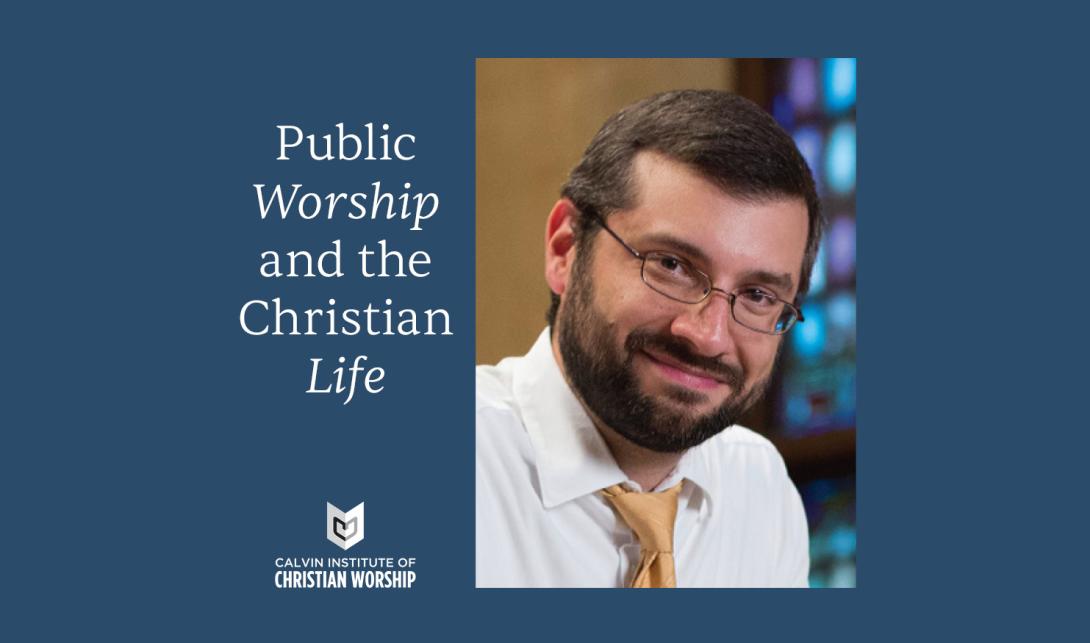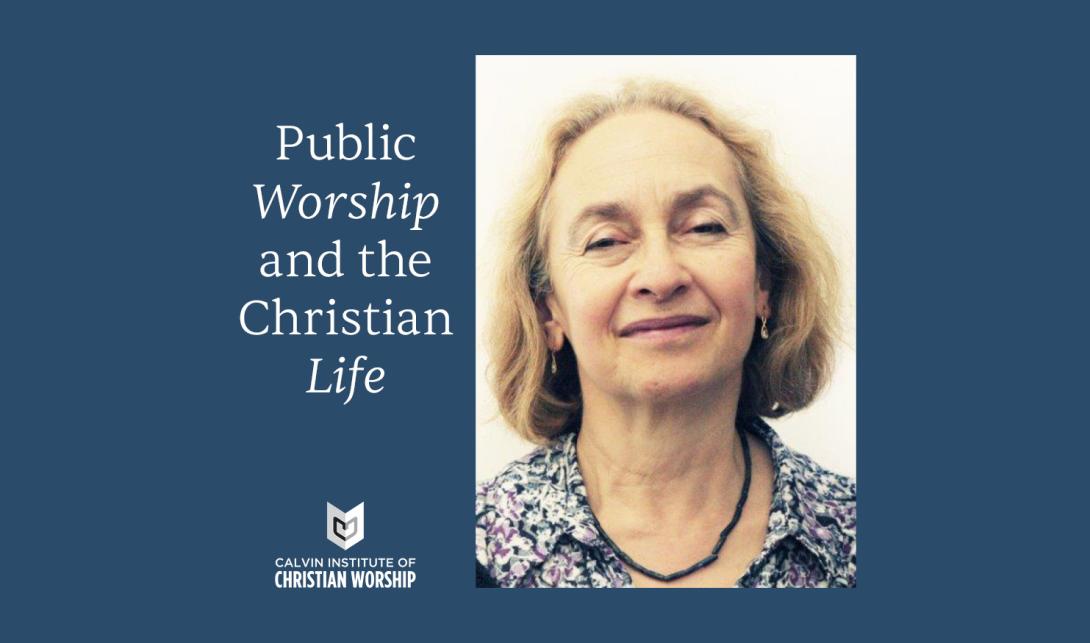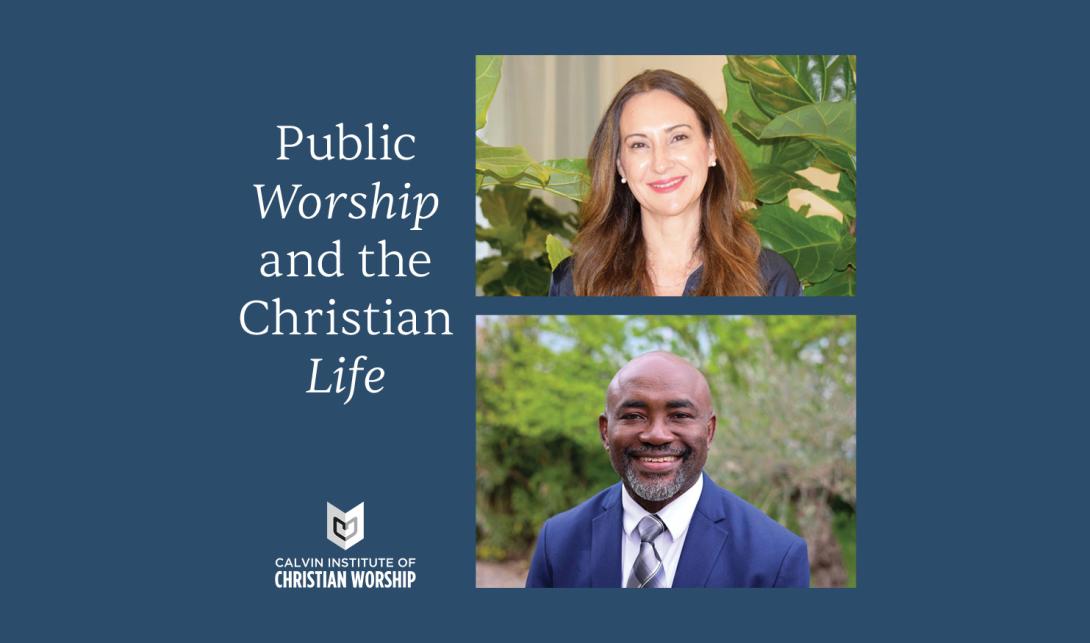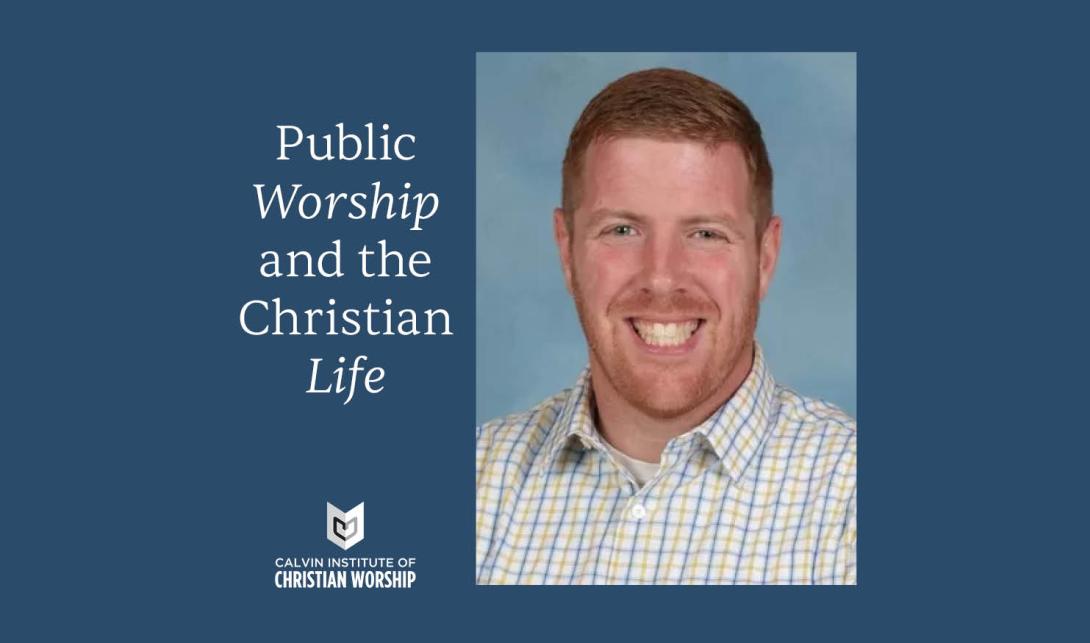Episode Details
Sarah Travis explores how Christian worship, through its rhythm of Gathering, Word, Table, and Sending, both unsettles us and equips us to do the work of conciliation and reconciliation with Indigenous peoples.
Transcript
|
Sarah Travis
00:00:04
|
00:00:04 |
And it wasn't until I was about eighteen years old and I attended a denominational event where a confession was made to Indigenous people in Canada. The church confessed to God for its mistreatment and colonization of Indigenous people in Canada. And that moment really stuck with me. |
|
Kristen Verhulst
00:00:30
|
00:00:30 |
Welcome to season five of Public Worship and the Christian Life, a podcast produced by the Calvin Institute of Christian Worship. This season highlights the new Worship and Witness book series by CICW and published through Cascade Books, an imprint of Wipf & Stock. The Worship in Witness series seeks to foster a rich interdisciplinary conversation on the theology and practice of public worship, a conversation that will be integrative and expansive. CICW Staff member Noel Snyder, also one of the series editors, and Kristen Verhulst talk with the authors of the first seven books in this series. We are pleased you've joined us in this conversation, and we look forward to sharing this learning. |
|
Kristen Verhulst
00:01:18
|
00:01:18 |
Good afternoon, everyone. My name is Kristen Verhulst. I’m a staff member at the Calvin Institute of Christian Worship. And my guest today on our podcast is Sarah Travis. Sarah is assistant professor of preaching, worship, and Christian ministry at Knox College, University of Toronto. And today I'm delighted to talk with Sarah about her new book, Unsettling Worship: Reforming Liturgy for Right Relations with Indigenous Communities. This book in part came from some research that Sarah has been doing around reconciliation among settler Canadians and Indigenous peoples. But I'd like, Sarah, for you to tell us just a little bit more about the story behind your book and why you wrote it. |
|
Sarah Travis
00:02:19
|
00:02:19 |
Thank you so much for your question and for taking this time to interview me. And thank you to the Calvin Institute for all it's done to inspire this work. I grew up knowing not a lot about Indigenous situations in Canada, where I live. We learned some things in school, but we also learned about a benign history of explorers and pioneers who came to settle the land. And so I did not know a lot. And it wasn't until I was about 18 years old and I attended a denominational event where a confession was made to Indigenous people in Canada. The church confessed to God for its mistreatment and colonization of Indigenous people in Canada. And that moment really stuck with me. But I have to say that I went through seminary and a doctoral degree without learning a whole lot more. There were a series of events in Canada that have happened in the last few years. One of those was the Truth and Reconciliation Commission that was similar in scope to what happened in South Africa. And it was an opportunity for settlers—people who have come to the land later than Indigenous people—it was an opportunity for us to reflect on who we were in relation to Indigenous people. Another thing that happened was there was a report on missing and murdered Indigenous women and girls, of which there are many. And this report also called for action on behalf of settlers and the country as a whole. And then finally, there's been graves discovered at residential schools across the nation of children who died following abuse and neglect after they had been taken from their families and deposited into these institutions where they were separated from their original languages and their communities, and many of them died. And so all of those things happened. And I started to wonder about my own settler identity, and I started to wonder about the church. And the reality is, these events that happened in my country were so tremendously important that they needed to be talked about in worship. And none of us had words for that. So this story really started when I ran out of words to talk about what had happened in my country. |
|
Kristen Verhulst
00:05:01
|
00:05:01 |
Thank you. I think this, as you mentioned, is a journey of learning a deeper story or a new aspect of a story that we simply haven't always been aware of. What have been some of the early reactions from your readers, those who've picked up your book? What are they saying back to you? |
|
Sarah Travis
00:05:23
|
00:05:23 |
Well, it's early days yet, but I have one reader who came back to me and said that this entire book was an act of repentance. And I found that really meaningful because in some ways that's what it is. It's my way of saying I'm sorry for the ways that I haven't participated well in the processes of conciliation and reconciliation. And I think that's a powerful message for the church, as my argument is that we are being called to repent and change direction, to change our ways. So that's a piece of feedback I have received. I'm looking forward to vigorous conversation around this book because what I'm hearing is that it's a difficult topic for people. The book is not accusatory, but it does pretty clearly name the ways that settlers have engaged in or avoided the work of reconciliation. So it will be difficult for some, certainly. |
|
Kristen Verhulst
00:06:31
|
00:06:31 |
Yes, I think that's exactly right. I appreciated so much your talking about [how] many terms for people are loaded with meaning, and for some people, they want to explore that. Others want to shut it down; they get fearful. How would you encourage those who are eager to talk about this, introduce that to their worshiping community, and yet recognize there will be resistance? |
|
Sarah Travis
00:07:02
|
00:07:02 |
I think we need to start with the stories. We need to start by [ask]ing: What has happened, and where are we? And some of them are very, very hard stories to tell. One of the problems I see is that a lot of settlers do not have relationships with Indigenous people, and in some ways, this book encourages that development of actual, real relationships between real bodies. So I think that if congregations are able to open themselves to the possibility that God is calling them into this work, that they will be more receptive of it. But first, they need to come to terms with a lot of horrible history and come to terms with what it means to take responsibility for something that we didn't start. Perhaps one of the hardest parts will be to acknowledge that. The need is ongoing, that colonization is an ongoing project. So I think it's easier in some ways to talk about the ways that this will be difficult and harder to talk about the ways to make it easier. |
|
Kristen Verhulst
00:08:30
|
00:08:30 |
In your introduction, you mention this term “third space” as perhaps a helpful posture and approach. Could you just talk a little bit more about what you mean by that? |
|
Sarah Travis
00:08:42
|
00:08:42 |
Sure. That's a term that comes out of postcolonial theory, first coined by Homi Bhabha, who meant something very complex by it, but in simplest terms, when two cultures come together or two or more cultures come together, there's overlap between those cultures, and they change each other. So I've taken this idea of third space and wondered, How is it a productive space? How is it a space where relationship happens and confession happens and transformation happens? And in my thinking, the ways that those positive things happen is through the presence of the triune God in that space. So a third space is a space that doesn't belong to settlers and it doesn't belong to Indigenous people, but it's a space inhabited by God. And into that space we bring all of who we are. But it's a point of contact, a place where a negotiation can happen. I think worship functions as a third space where we come together in all of our different cultures and all of our different identities, and we encounter God and in some way those relationships are transformed in that space. |
|
Kristen Verhulst
00:10:03
|
00:10:03 |
And I think that is closely related to this idea of worship and planning for worship, being a community of worshipers, “traditioned innovation.” And I used to wonder if you might just say a little bit more about that, because you also lead into that in the introduction. |
|
Sarah Travis
00:10:21
|
00:10:21 |
I would say traditioned innovation means that we're not entirely reinventing the wheel. We're clinging to those positive identity markers that we have as a church. But we're using that as a springboard to something new. So we begin with something that is familiar and commonplace. And we wonder what happens if it is to be transformed and made new. |
|
Kristen Verhulst
00:10:53
|
00:10:53 |
Tell us a little bit more about the structure, how the book unfolds. And then maybe was there a particular one of the movements of worship that you felt really lended itself well to what you were hoping to achieve in introducing these ideas to worship planners, to leaders? |
|
Sarah Travis
00:11:11
|
00:11:11 |
I was most moved, I think, by the idea of the assurance of pardon in a worship service. It's a moment in worship that follows the prayer of confession, and we hear it and we move on with our day. But when I was writing this book, it really struck me how central that is, that moment is, to our faith and our relationship with God and with other people—that it means everything that we have been forgiven and made free, and it is only in that sense of forgiveness that we can move forward toward right relations. So that gathering piece was really essential. And then the recognition that worship does not end with the benediction, and that space between the benediction and the gathering again is where the real work happens. That's where the real work of conciliation and reconciliation happens. |
|
Kristen Verhulst
00:12:19
|
00:12:19 |
I was struck by the way that this realization of the importance of this work begins a little bit in a personal sense, but truly is communal work for any real traction to happen. So how would you guide a pastor, a worship leader who's really just beginning to think about this, really wants to do this thoughtfully and in a pastoral way with their community. How do they get started? What would you suggest? |
|
Sarah Travis
00:12:52
|
00:12:52 |
In almost every case where we're trying to move forward and repair broken relationships, we need to start together. So we need to start as a community and start in conversation. There are spaces in every congregation where there's room to have conversations about who's my neighbor and how do I treat my neighbor. And I think those kinds of conversations need to be possibly started by worship leaders and perhaps in worship, but they need to be continued outside of the sanctuary. It's a communal task, and I don't think it will work well for a worship leader or minister to go in on their own and try and drag everyone else along with them. I think it needs to be rooted in a much larger conversation. |
|
Kristen Verhulst
00:13:51
|
00:13:51 |
Yeah, it's one of those examples where a lot of careful work maybe needs to be done slowly and in very thoughtful ways rather than just jumping in on something that can be unsettling for people wanting the community to grow together and not be at odds. What other words of hope, encouragement, would you give to those who lead worshiping communities, ways that they can feel encouraged by this really wonderful and thoughtful book that you have here? |
|
Sarah Travis
00:14:29
|
00:14:29 |
I think it's important to remember that this is hard work, and it's necessary work, but it's sacred work. It's work that we're called by God to do and we're equipped by God to do, which is comforting because on our own, we don't have much hope of achieving repaired relationships. We kind of proved that over and over in our behaviors as cultures. So I think acknowledging that it is sacred work. There's more to the story than colonial violence. It's the core of our faith, that colonial violence is not the end of the story. It is a moment that leads toward resurrection. And so that is the hope. The book ends with a vision of a banquet. Again, that idea of third space where cultures come together, and the table is laid with baguettes and bannock and all kinds of different flavors and foods. And it's a space of conversation and a space where God is and we can talk about power and we can confess and we can say what really happened and how we really experienced it. So that is the hope, that we'll find those spaces where we can be truthful and hopeful. |
|
Kristen Verhulst
00:15:59
|
00:15:59 |
Sarah Travis, thanks so much again for talking about your book Unsettling Worship: Reforming Liturgy for Right Relations with Indigenous Communities. So grateful to talk with you today. |
|
Sarah Travis
00:16:12
|
00:16:12 |
Thank you so much. |
Our Lastest Episodes
Jared Ortiz on the Dramatic Nature of the Nicene Creed
Jared Ortiz, professor at Hope College, Holland, Michigan, describes the Nicene Creed as a dramatic and powerful statement where every word is like a declaration of war, saying yes to the truth and no to many falsehoods.
Jane Williams on the Nicene Creed as a Creative and Exciting Description of Who God Is
Jane Williams, professor of theology at St. Mellitus College in London, England, sees the Nicene Creed, crafted 1700 years ago, as an extraordinary creative and exciting description of who God is and therefore what we trust in as Christians in God's world.
Maria Eugenia Cornou and Mikie Roberts on the Doxological and Historical Significance of the Nicene Creed
Maria Eugenia Cornou and Mikie Roberts serve on a planning team for an October worship event in Egypt to mark the 1700th anniversary of the Council of Nicaea and the ecumenical creed that emerged in the year 325 and remains firmly embedded in the worship practices of the church today.
Jared Ortiz on the Dramatic Nature of the Nicene Creed
Jared Ortiz, professor at Hope College, Holland, Michigan, describes the Nicene Creed as a dramatic and powerful statement where every word is like a declaration of war, saying yes to the truth and no to many falsehoods.
Jane Williams on the Nicene Creed as a Creative and Exciting Description of Who God Is
Jane Williams, professor of theology at St. Mellitus College in London, England, sees the Nicene Creed, crafted 1700 years ago, as an extraordinary creative and exciting description of who God is and therefore what we trust in as Christians in God's world.
Maria Eugenia Cornou and Mikie Roberts on the Doxological and Historical Significance of the Nicene Creed
Maria Eugenia Cornou and Mikie Roberts serve on a planning team for an October worship event in Egypt to mark the 1700th anniversary of the Council of Nicaea and the ecumenical creed that emerged in the year 325 and remains firmly embedded in the worship practices of the church today.
Robby Kiley on Creating Inclusive Community and Welcome
In this episode, Robby Kiley of Saint Pius X Parish in Granger, Indiana, shares how a grant project focused on welcome at the Mass for people across the spectrum of abilities extended beyond worship into a wider embrace of people in community and participation.





